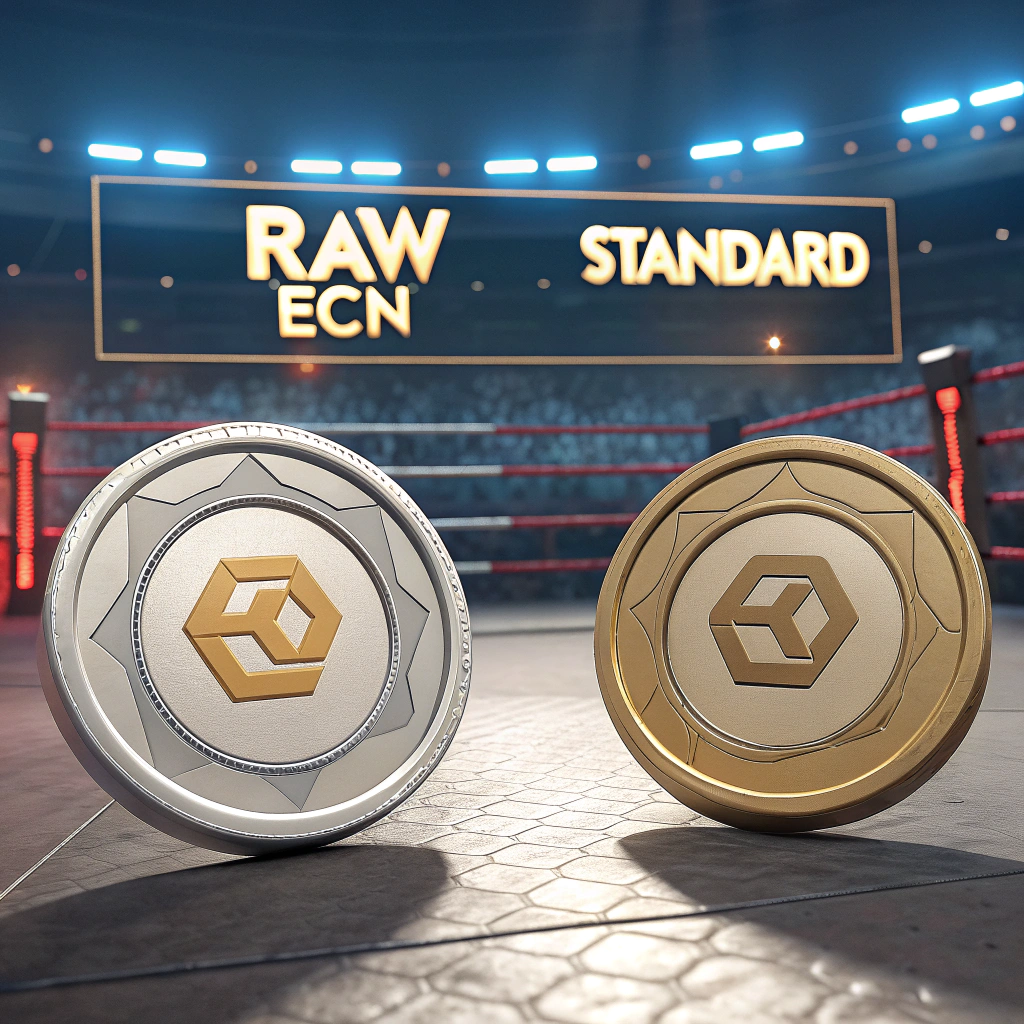
Understanding Raw ECN Accounts
What Is a Raw ECN Account in Forex?
A Raw ECN (Electronic Communication Network) account connects traders directly to liquidity providers without any dealing desk intervention. This model allows for real-time order execution and access to institutional-grade pricing. Instead of markups, traders pay a small commission per trade, with spreads as low as zero during peak liquidity.
Key Features of Raw ECN Trading
- Tight Spreads: As low as 0.0 pips
- Direct Market Access (DMA): Orders routed to top-tier liquidity providers
- Commission-Based Model: Transparent trading costs
- No Requotes or Delays: Real-time execution, ideal for scalpers and algorithmic traders
- Market Depth Access: Visibility into bid/ask volumes
Top Raw ECN Forex Brokers
| Broker | Minimum Deposit | Commission Per Lot | Average Spread (EUR/USD) | Platforms |
| IC Markets | $200 | $3.50 per side | 0.1 pips | MT4, MT5, cTrader |
| Pepperstone | $200 | $3.50 per side | 0.2 pips | MT4, MT5, cTrader |
| FP Markets | $100 | $3.00 per side | 0.0–0.2 pips | MT4, MT5 |
Standard Accounts Explained
What Is a Standard Forex Account?
A standard account typically operates on a dealing desk or STP model, where the broker either fills orders internally or routes them through a liquidity provider with a spread markup. It’s designed for convenience and simplicity, especially for beginners who prefer fixed or variable spreads over commissions.
Main Characteristics of Standard Accounts
- Spread-Based Pricing: No additional commission fees
- Simplified Cost Structure: Easy to calculate trading costs
- Broader Accessibility: Lower trading stress for new traders
- Potential for Requotes: Especially during high volatility
- Broker Intervention Possible: Depending on the execution model
Raw ECN vs Standard Options: Side-by-Side Comparison
Spreads, Commission, and Trading Costs
| Feature | Raw ECN Account | Standard Account |
| Spreads | 0.0–0.2 pips | 1.0–2.0 pips |
| Commission | Yes (typically $6–$7 round trip) | None |
| Total Cost per Trade | Lower for active traders | Higher for low-volume traders |
Execution Speed and Market Access
Raw ECN accounts offer faster, more transparent execution by linking directly to liquidity providers. Standard accounts may experience delays or requotes during volatility due to intermediary involvement.
Suitable Trading Styles and Experience Levels
- Raw ECN: Ideal for scalpers, high-frequency, and institutional traders
- Standard: Better suited for beginners and swing traders focusing on ease over precision
Pros and Cons of Raw ECN Accounts
Benefits of Raw ECN Accounts
- Institutional pricing and tight spreads
- Faster execution with minimal slippage
- Greater transparency and control over trades
- Competitive environment with real market depth
Drawbacks to Consider
- Commission fees can impact micro traders
- Requires more experience with execution settings
- Performance may depend on broker’s infrastructure
Pros and Cons of Standard Accounts
Benefits of Standard Accounts
- No commissions, simple to calculate costs
- More forgiving for casual or low-frequency traders
- Typically lower minimum deposit requirements
Limitations to Watch Out For
- Wider spreads reduce profitability on short-term trades
- Possible delays or slippage under volatility
- Broker may act as counterparty, creating potential conflicts of interest
Fee Structures Compared: Raw ECN vs Standard Options
Transparent Pricing vs Spread Markups
Raw ECN accounts separate spreads and commissions, offering full visibility into trading costs. Standard accounts embed fees within spreads, which can fluctuate and obscure real costs.
How Fees Impact Long-Term Profitability
For active traders, tighter spreads with commissions often result in lower total costs. Infrequent traders may benefit more from a flat spread model. Here’s a cost scenario:
| Trade Volume | Raw ECN Cost | Standard Account Cost |
| 1 lot | $6 commission + 0.2 pips spread = ~$8 | 1.5 pips spread = ~$15 |
| 10 lots | $60 + $16 = $76 | $150 |
How to Choose Between Raw ECN and Standard Accounts
Factors to Consider Before Choosing
- Trading Frequency: Scalpers benefit from ECN
- Experience Level: Standard accounts are beginner-friendly
- Capital Size: ECN often requires higher minimums
- Platform MT4 MT5 and Execution Needs: ECN supports automation better
Best Account Types by Trader Profile
| Trader Type | Recommended Account |
| Beginner | Standard |
| Scalper | Raw ECN |
| Algo Trader | Raw ECN |
| Occasional Trader | Standard |
| High Volume Trader | Raw ECN |
Tips for Trading with a Raw ECN Account
Best Practices for Execution and Risk Management
- Use VPS hosting for ultra-low latency
- Monitor slippage and execution quality regularly
- Avoid trading during low liquidity sessions
- Employ tight risk parameters and avoid overleveraging
- Choose brokers with verified ECN execution and deep liquidity
Final Thoughts: Choosing the Right Trading Model
Both raw ECN and standard account models have distinct advantages depending on your strategy, capital, and trading style. ECN accounts provide unmatched transparency and performance for serious traders, while standard accounts remain an accessible entry point for newcomers. Evaluating your goals, costs, and execution needs will help you make a profitable decision in the long run.
FAQs: Raw ECN vs Standard Options
What is the difference between raw ECN and standard accounts?
Raw ECN offers direct market access with tight spreads and commission fees. Standard accounts use markups on spreads with no commissions, offering a simpler cost structure.
Is raw ECN better for scalping and high-frequency trading?
Yes, due to faster execution and lower spreads, raw ECN is ideal for fast-paced strategies like scalping and HFT.
Can beginners use a raw ECN account?
While possible, beginners may find the commission structure and tighter execution requirements of ECN accounts more complex.
Are raw ECN accounts really commission-based only?
Yes, typically raw ECN accounts charge a fixed commission per lot and pass raw spreads without markups.
How does ECN pricing differ from standard pricing?
ECN pricing reflects real-time bid/ask quotes from liquidity providers, often leading to tighter spreads and more accurate market pricing.
